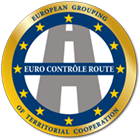TRACE project presents outcome to EU member states at the general secretariat of the Benelux
The EC co-financed project TRACE organised a roll out of the project outcome to policy makers at the Benelux General Secretariat in Brussels on March 27th. The Trace consortium groups all stakeholders in the European enforcement environment: Euro Contrôle Route (ECR), CORTE, TISPOL en VOSA.
TRACE (Transport Regulation Align Control Enforcement) aims to harmonise the training on social legislation in the road haulage sector, mores specifically driving- and resting hours (EC 561/2006). The main objectives of the project are to:
- develop a harmonised and practical explanation of the legislations for enforcers at the roadside
- develop a curriculum and training material
- distribute the training to the parties responsible for training within the various enforcement organisations
During the event the training was introduced to policy makers from the 27 member states.
During the first phase of the project there had been ample opportunity to suggest improvements to the training content and material. During this event the emphasis was put on presenting the material and preparing the dissemination.
The genesis of the project was explained by representatives of the European Commission (EC). When the social legislation was first introduced in 2006, preliminary studies showed that the training practices in the member states varied significantly and that this was perceived as a problem by the road haulage industry. Throughout the years the problem became more and more urgent to the industry. In 2010 the EC put forward a project a project proposal to harmonize control practices through the harmonisation of training. The EC strongly supports the objectives of the project and is encouraged by the fact that for the first time all European enforcement organisations have jointly put their shoulders under this project.
That the varying control practices are a problem for the industry was confirmed and illustrated by representatives from IRU and UETR. Not only do they support the development of a European curriculum for enforcement staff they are very much an interested party. After all drivers have to be able to show that they know and are able to apply the legislation.
A recurring complaint at the roadside is that the legislation is far too complicated and written in legalese and because of that difficult to enforce. For this reason the project resolutely opted for a practical approach and developed the following materials:
- a harmonized explanation of the legislation
- a course book with exercises and test questions
- a powerpoint presentation with didactical pointers for the trainer
In the final phase of the project (May and june) four train the trainer sessions will be organized in Brussels, Madrid , Budapest and Cologne.
The first train the trainer session will take place at the general secretariat on May 2nd, 3rd and 4th 2012.
10/04/2013 - 14:07
